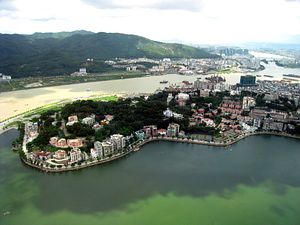As the political crisis caused by the Occupy Central movement deepens in Hong Kong, many observers (here and here) have pondered whether a similar “occupy” movement could occur in Macau. In short: no, for three main reasons.
First and foremost, the “one country, two systems” model’s effectiveness is reflected in Macau’s stellar economic performance since 2003. According to World Bank data, Macau’s GDP per capita in 2013 is over $90,000, making it the fourth richest in the world. When Macau was return to China, its GDP per capita was only about $14,000. Meanwhile, Hong Kong’s GDP per capita in 2013 is about $38,000, which is a modest increase from the $27,000 it had in 1997 when it was returned to China. So there is no doubt that Macau’s economy has experienced perhaps the rapidest growth in the world for the last decade or so, largely thanks to the Chinese central government’s supportive social and economic policies. It is no exaggeration to say that Macau’s economy would not have grown had it not been for the central government’s supportive policies.
And it is not just Macau’s economy that has thrived; its higher education sector has also developed very quickly, as evidenced by the rapid rise of one of Macau’s major institutions of higher education: the University of Macau. The University of Macau ranks among the top 300 universities in the world, surpassing many universities in Hong Kong despite its very short history. Against this backdrop, it is unsurprising that most Macau residents are mostly satisfied with their lives, as indicated by the very high level of happiness among Macau residents. Of course, this does not mean there is no room for improvement in terms of economic development. High inflation and high housing prices are among the most important factors negatively influencing Macau resident’s satisfaction level. Still, Macau’s average housing prices are about 30 percent lower than those in Hong Kong.
The second major reason for Macau’s success is political stability and unity. As the last Portuguese governor of Macau, Vasco Rocha Vieira, said, the “one country, two systems” model has ensured political stability in Macau, which then created favorable social conditions for overall development. Under the “one country, two systems” model, Macau enjoys a high level of local autonomy and can make decisions freely on a wide range of policy issues. As a result, Macau people’s identification with China has been sustained at a very high level in recent years. Furthermore, trust in the Macau government, the Chinese government, and the “one country, two systems” model have all stayed at a very high level. In this regard, there is a noticeable difference between Macau and Hong Kong. In recent years, Hong Kong has been plagued by endless political divisions and empty debates, resulting in ineffective policy formulation and implementation. If the current “Occupy Central” crisis cannot be resolved quickly, Hong Kong’s future indeed will not be as bright as Macau’s.
The third reason is that the Macau government has implemented effective social and economic policies as its economy has expanded. Today, Macau has one of the best social welfare systems in Asia, particularly for the elderly who can enjoy a comfortable life with government support. For the last six years, the Macau government has also had a very generous cash hand out policy, giving every Macau resident, permanent and temporary, a solid sum of cash. In 2013, each permanent resident received about $1,000. So Macau residents usually do not have many complaints about economic development, perhaps with the exception of high housing prices. In this regard, there is again a noticeable difference between Macau and Hong Kong, and in the latter case, development stagnation and inequality contribute to the current crisis in a major way.
Certainly, Macau can improve its governance quality by focusing more on social and economic issues and on building a democratic system with Macau characteristics. Both the central government and Macau government have pledged to implement more policy measures to achieve important goals such as better public housing, better educational institutions and more transparency. One needs to be patient as these measures are implemented — particularly after witnessing the instability, divide, and even chaos in Hong Kong. Perhaps it is time now for Hong Kong to learn from Macau.

































